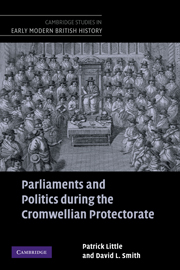Book contents
- Frontmatter
- Contents
- Preface
- List of abbreviations
- 1 Introduction: historiography and sources
- 2 Parliament and the paper constitutions
- 3 Elections
- 4 Exclusions
- 5 Factional politics and parliamentary management
- 6 Oliver Cromwell and Parliaments
- 7 Richard Cromwell and Parliaments
- 8 Law reform, judicature, and the Other House
- 9 Religious reform
- 10 Representation and taxation in England and Wales
- 11 Parliament and foreign policy
- 12 Irish and Scottish affairs
- 13 Conclusion
- Appendix 1 Members excluded from the Second Protectorate Parliament
- Appendix 2 The Remonstrance of 23 February 1657
- Bibliography
- Index
- Titles in the series
5 - Factional politics and parliamentary management
Published online by Cambridge University Press: 17 July 2009
- Frontmatter
- Contents
- Preface
- List of abbreviations
- 1 Introduction: historiography and sources
- 2 Parliament and the paper constitutions
- 3 Elections
- 4 Exclusions
- 5 Factional politics and parliamentary management
- 6 Oliver Cromwell and Parliaments
- 7 Richard Cromwell and Parliaments
- 8 Law reform, judicature, and the Other House
- 9 Religious reform
- 10 Representation and taxation in England and Wales
- 11 Parliament and foreign policy
- 12 Irish and Scottish affairs
- 13 Conclusion
- Appendix 1 Members excluded from the Second Protectorate Parliament
- Appendix 2 The Remonstrance of 23 February 1657
- Bibliography
- Index
- Titles in the series
Summary
Over fifty years have passed since Hugh Trevor-Roper wrote his controversial assessment of the politics of the Protectorate Parliaments. His primary concern was to explain how Oliver Cromwell failed to get what he wanted from the Parliaments that sat in 1654 and 1656; but he was also interested in the nature of parliamentary management. His conclusions on Cromwell are well known, and provocative:
The one English sovereign who had actually been a member of Parliament proved himself as a Parliamentarian the most incompetent of them all. He did so because he had not studied the necessary rules of the game. Hoping to imitate Queen Elizabeth, who by understanding these rules had been able to play upon her ‘faithful Commons’ as upon a well-tuned instrument, he failed even more dismally than the Stuarts.
According to Trevor-Roper, the corollary of this ‘vacuum of leadership’ at the centre was that the Protectorate Parliaments were beset by factionalism, with the ‘country’ party (led by ‘Presbyterian’ veterans from the 1640s) opposing the ‘courtiers’ in 1654–5, and the ‘kingship’ party in 1656–7 trying to foist a new monarchical constitution on Cromwell. The rejection of the crown gave power instead into the hands of the army, and this, together with the return of a republican caucus to Parliament in 1658 and 1659, brought chaos, and the ineffectual Richard Cromwell was forced to dissolve Parliament and resign as Protector.
- Type
- Chapter
- Information
- Parliaments and Politics during the Cromwellian Protectorate , pp. 102 - 126Publisher: Cambridge University PressPrint publication year: 2007



